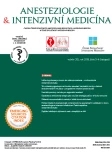De-escalation of antibiotic therapy as a part of care strategy about critically ill patients
Authors:
V. Adámková
Authors‘ workplace:
Klinická mikrobiologie a ATB centrum, Ústav lékařské biochemie a laboratorní diagnostiky, Všeobecná fakultní nemocnice v Praze a 1. lékařská fakulta Univerzity Karlovy
Published in:
Anest. intenziv. Med., 30, 2019, č. 3-4, s. 145-152
Category:
Intensive Care Medicine - Review Article
Overview
One of the biggest problems of medicine is the extreme increase of bacterial resistance making the antibiotic treatment harder on the ICU as well as in the community. In order to maintain the efficacy of existing antibiotics, close interdisciplinary cooperation in diagnostics of infectious diseases along with an appropriate choice of antibiotics is crucial. Antibiotics must only be used for the treatment of bacterial infections, not as treatment of natural bacterial colonisations. Although de-escalation is one of the strategies of antibiotic stewardship, its role in intensive care is still unclear. For any modification in the antibiotic treatment, the microbiological results must be related to the patient’s clinical status to prevent damage to patient’s health.
Keywords:
colonisation – resistance – multidrug resistant bacteria – de-escalation
Sources
1. D'Costa VM, King CE, Kalan L, et al. Antibiotic resistance is ancient. Nature. 2011;477:457–461.
2. Magiorakos AP, Srinivasan A, Carey RB, et al. Multidrug-resistant, extensively drug-resistant and pandrug-resistant bacteria: an international expert proposal for interim standard definitions for acquired resistence. Clin Microbiol Infect. 2012;18:268–281.
3. Kumar A, Ellis P, Arabi Y. Initiation of inappropriate antimicrobial therapy results in a fivefold reduction of survival in human septic shock. Chest. 2009;136:1237–1248.
4. Peterson LR. Bad Bugs, No Drugs: No ESCAPE Revisited. CID. 2009;49:992–993.
5. Magill SS, Edwards JR, Fridkin SK. Emerging Infections Program Healthcare-Associated Infections and Antimicrobial Use Prevalence Survey Team. Survey of health care-associated infections. N Engl J Med. 2014;370:2542–2543.
6. Vardakas KZ, Dimitrios K, Matthaiou DK. Characteristics, risk factors and outcomes of carbapenem-resistant Klebsiella pneumoniae infections in the intensive care unit. J Infect. 2015;70:592–599.
7. Friedman ND, Temkin E, Carmeli Y. The negative impact of antibiotic resistence. Clin Microbiol Infect. 2016;22:416–422.
8. Pogue JM, Kaye KS, Cohen DA, Marchaim D. Appropriate antimicrobial therapy in the era of multidrug-resistant human pathogens. Clin Microbiol Infect. 2015;21:302–312.
9. http://atlas.ecdc.europa.eu/public/index.aspx.
10. Tängdén T, Giske CG. Global dissemination of extensively drug-resistant carbapenemase-producing Enterobacteriaceae: clinical perspectives on detection, treatment and infection control (Review). J Intern Med. 2015;277:501–512.
11. Annane D, Aegerter P, Jars-Guincestre MC, Guidet B. Current epidemiology of septic shock: the CUB-Rea Network. Am J Respir Crit Care Med. 2003;168:165–172.
12. Niederman MS. De-escalation therapy in ventilator-associated pneumonia. Curr Opin Crit Care. 2006;12:452–457.
13. Bassetti M, De Waele JJ, Eggimann P, et al. Preventive and therapeutic strategies in critically ill patients with highly resistant bacteria. Intensive Care Med. 2015;41:776–795.
14. Dellinger RP, Levy MM, Rhodes A, et al. Surviving Sepsis Campaign: international guidelines for management of severe sepsis and septic shock. 2012. Intens Care Med. 2013;39:165–228.
15. Silva BN, Andriolo RB, Atallah AN, Salomao R. De-escalation of antimicrobial treatment for adults with sepsis, severe sepsis or septic shock. Cochrane Database Syst Rev. 2013;3:CD007934. doi: 10.1002/14651858.CD007934.pub3.
16. Joung MK, Lee JA, Moon SY, et al. Impact of de-escalation therapy on clinical outcomes for intensive care unit-acquired pneumonia. Crit Care. 2011;15:R79.
17. Leone M, Bechis C, Baumstarck K, et al. AZUREA Network Investigators De-escalation versus continuation of empirical antimicrobial treatment in severe sepsis: a multicenter non-blinded randomized noninferiority trial. Intens Care Med. 2014;40:1399–1408.
18. Heenen S, Jacobs F, Vincent JL. Antibiotic strategies in severe nosocomial sepsis: Why do we not de-escalate more often? Crit Care Med. 2012;40:1404–1409.
19. Gonzalez L, Cravoisy A, Barraud D, et al. Factors influencing the implementation of antibiotic de-escalation and impact of this strategy in critically ill patients. Crit Care. 2013;17:R140.
20. Paskovaty A, Pastores SM, Gedrimaite Z, et al. Antimicrobial de-escalation in septic cancer patients: is it safe to back down? Intens Care Med. 2015;41:2022–2023.
21. Morel J, Casoetto J, Jospe R, et al. De-escalation as part of a global strategy of empiric antibiotherapy management: a retrospective study in a medico-surgical intensive care unit. Crit Care. 2010;14:R225.
22. De Waele JJ, Ravyts M, Depuydt P, et al. De-escalation after empirical meropenem treatment in the intensive care unit: fiction or reality? J Crit Care. 2010;25:641–646.
23. Alvarez-Lerma F, Alvarez B, Luque P, et al. ADANN Study Group. Empiric broad-spectrum antibiotic therapy of nosocomial pneumonia in the intensive care unit: a prospective observational study. Crit Care. 2006;10:R78.
24. Knaak E, Cavalieri SJ, Elsasser GN, et al. Does antibiotic de-escalation for nosocomial pneumonia impact intensive care unit length of stay? Infect Dis Clin Pract. 2013;21:172–176.
25. Garnacho-Montero J, Gutierrez-Pizarraya A, Escoresca-Ortega A, et al. De-escalation of empirical therapy is associated with lower mortality in patients with severe sepsis and septic shock. Intens Care Med. 2014;40:32–40.
26. Mokart D, Slehofer G, Lambert J, et al. De-escalation of antimicrobial treatment in neutropenic patients with severe sepsis: results from an observational study. Intens Care Med. 2014;40:41–49.
27. La Martire G, Robin Ch, Oubaya N, et al. De-escalation and discontinuation strategies in high-risk neutropenic patients: an interrupted time series analyses of antimicrobial consumption and impact on outcome. Eur J Clin Microbiol Infect Dis. 2018;37:1931–1940.
28. Tabah A, Cotta MO, Garnacho-Montero J. A Systematic review of the definitions, determinants, and clinical outcomes of antimicrobial de-escalation in the intensive care unit. CID. 2016:62;1009–1017.
Labels
Anaesthesiology, Resuscitation and Inten Intensive Care MedicineArticle was published in
Anaesthesiology and Intensive Care Medicine

2019 Issue 3-4
Most read in this issue
- Kapilární návrat – klinické vyšetření přítomnosti cirkulační koherence?
- Basic neuromodulation methods in chronic pain management
- De-escalation of antibiotic therapy as a part of care strategy about critically ill patients
- Zajištění obtížných dýchacích cest u dospělých a dětí
